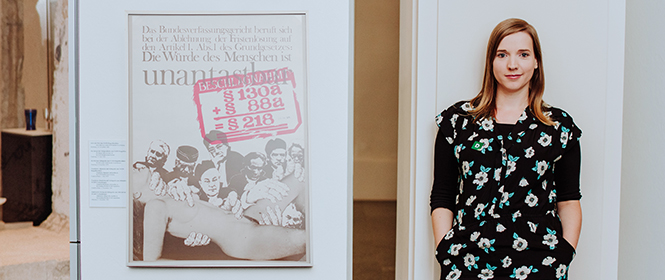
‘I THINK IT’S IMPORTANT TO ACKNOWLEDGE ACHIEVEMENTS’
My favourite piece of history: author and activist Anne Wizorek presents her favourite object at Deutsches Historisches Museum.
My favourite piece of history at Deutsches Historisches Museum is a placard from 1975 opposing the rejection of first-trimester abortions. At the time, the ruling Social Democrats (SPD) introduced plans to legalise abortions during the first three months of pregnancy. The Christian Democrats (CDU and CSU) successfully appealed to the Federal Constitutional Court, meaning abortion remained illegal. The placard challenges the reasons given by the judges, who had cited the inviolability of human dignity as laid out in German law, and shows the judges themselves as a group of old men with their hands all over a naked female body.
When I see the placard, it strikes me as a pretty blunt approach – and one that I perhaps wouldn’t adopt nowadays. It does, however, clearly show how much feminism has achieved in recent decades, such as the fact that the first-trimester abortions demanded back then are now reality. As an activist, I think it’s sometimes important to acknowledge successes before going on to fight the next battle.
At the same time, the placard – which is more than 30 years old – shows me how much work still needs to be done. Most people probably don’t even know that a termination is still illegal in Germany. It has simply been decriminalised under certain circumstances. I and many other feminists would like to change this. In our opinion, abortion is part of sexual self-determination and therefore a human right.
We are also a long way from gender equality in other areas. Older feminists sometimes take the view, ‘We’ve already achieved everything. What more do you want?’ Up until a particular age, it may well be true that girls and women are less affected by sexism. But when they start thinking about family planning (at the latest), many women will notice that they are treated differently to their male colleagues. Although women of my generation experience this revelation later than the women who made the placard back then, they still experience it.
Therefore, today’s feminist activism is no less important, but is instead expressed differently. It uses different channels, particularly the Internet – where it’s much easier to communicate, find like-minded people and launch campaigns such as the ‘Aufschrei’ (protest) hashtag.
My experience of talking to older women is that there was a time when many of them feared that no one would carry on the feminist tradition and that the young women of today would no longer be interested in politics. I think that this fear is unfounded. When I look around and see how some sections of society are trying to turn back the clock in terms of women’s rights, I know that feminists are needed more than ever.